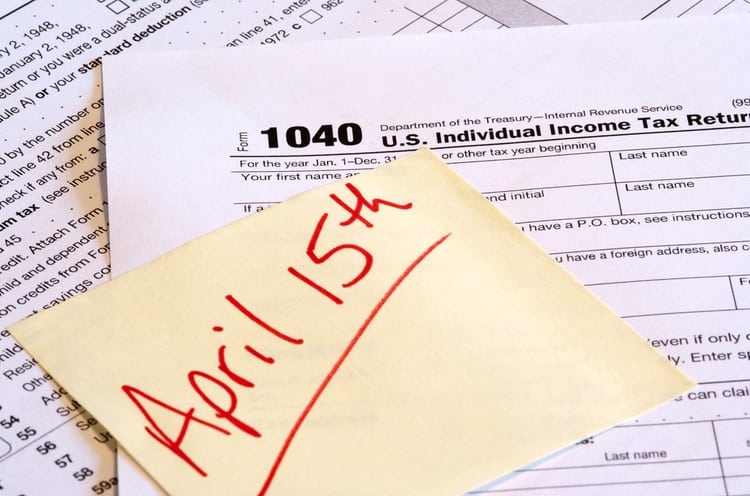Tax Tips for Bloggers: How & When to Report Blog Income
Our readers always come first
The content on DollarSprout includes links to our advertising partners. When you read our content and click on one of our partners’ links, and then decide to complete an offer — whether it’s downloading an app, opening an account, or some other action — we may earn a commission from that advertiser, at no extra cost to you.
Our ultimate goal is to educate and inform, not lure you into signing up for certain offers. Compensation from our partners may impact what products we cover and where they appear on the site, but does not have any impact on the objectivity of our reviews or advice.
Are you a blogger that struggles with the whole tax thing? Ever had questions about blog taxes, reporting your income, what tax entity you might need to file as, etc? This tax professional shares his best tax tips for bloggers.

Our mission at DollarSprout is to help readers improve their financial lives, and we regularly partner with companies that share that same vision. If a purchase or signup is made through one of our Partners’ links, we may receive compensation for the referral. Learn more here.
Whether your blog started as a fun way to share your trip to Europe, or you started with the intent to create an additional income stream from home, it’s no secret that you can make a living from blogging.
Few of us are opposed to an additional revenue source. However, it’s important to remember that generating income, in any way, likely bears with it the responsibility to report your earnings to the IRS.
As such, this purpose of this article is to share some blog tax tips and the answers to some common accounting questions that you may find helpful as you navigate throughout your blogging journey.
The 3 Phases of Blogging (Going from Hobby to Full-Time Blogger)
Let’s start by talking about the three most common “phases” of blogging, and what each phase might require when it comes to reporting blog income.
1. Hobby Phase
You and your spouse love taking photos and wanted to share your trip to Disneyland. You have no current plans to blog seriously, but it’s a fun way to share your life with the world.
BUSINESS FORMATION: None.
ACCOUNTING: Minimal needed – keep track of any income you earned from the blog and report it on your personal tax return as “Other Income” by tax day each April.
TAXES: Since this is legitimately a hobby, you don’t need to worry about letting the government know about your Disney adventures unless you actually made a buck off it.
However, if you make money from your blog (advertisements, affiliate kickbacks, etc.) this is considered income and should be reported on your personal tax return as “Other Income” regardless of the amount. It’ll be added to your other sources of income and taxed as ordinary income.
You don’t have to pay self-employment taxes on this since it isn’t considered earned income from employment.
Because it’s only a hobby, you can’t deduct any expenses against your income or counteract income from other sources. That new computer, hosting fees, etc. might as well have been spent on Mickey Mouse hats for all the IRS cares.
2. Side Hustle Phase
You’ve got a knack for writing and found this to be a great way to make some extra money. You are actually blogging with the intention of growing your reach and earning more than you spend each year. It’s at this point (where money is finally coming in) that a common question arises. Do bloggers have to pay taxes?
And the answer to that, as you might have guessed, is yes.
Let’s look at what all is required.
BUSINESS FORMATION: Most likely you’ll start as a sole proprietor unless you took the time to form an LLC. It might be worth your time to consult a CPA, attorney, or business expert to determine if/when it’d be beneficial to officially form beyond a Sole Proprietor.
Most side-hustlers don’t find a need to establish beyond a sole proprietorship since this is still a side gig.
ACCOUNTING: Basic knowledge required.
Since you are running a legitimate business, you’re expected to keep accurate and complete records of all income, expenses, and business dealings. You don’t have to pay for accounting software, but it can definitely save a lot of headache if you keep on top of your books every so often.
TAXES: As a legitimate business, you have all the rights and responsibilities that come with it. Sole proprietorships (and most single-member LLCs) will file something called a Schedule C with their personal 1040. You will be required to pay self-employment taxes based on your business net income each year in addition to any other income.
Depending on how big your side-hustle income is, you may need to file quarterly estimated taxes throughout the year or face a penalty (one of the ways the government incentivizes you to pay throughout the year instead of in one big lump sum).
You can now deduct legitimate business expenses related to your side-hustle. Hosting fees, advertising, and payments to contractors are all allowable expenses.
You are required to follow all of the rules of a legitimate business, not just the ones you feel like doing.
Related: 8 Affiliate Marketing Strategies to Drive Massive Sales
3. Self-Employment Phase
This is your actual occupation. The income from your blog is what puts food on the table and pays for your mortgage.
BUSINESS FORMATION: While still available to you during the side hustle phase, the choice between forming a sole proprietorship, LLC, partnership, or corporation becomes more important.
Not only based on how you want to be taxed, but also your plans to grow or include other people in the business.
ACCOUNTING: Basic to advanced knowledge required.
The essential requirements aren’t any different than operating as a side-hustle. However, depending on your chosen entity and complexity of business, it’s likely you’ll need some outside help. Hiring a bookkeeper, Virtual CFO, or seeking out business coaching can keep you sane and enjoying the parts of your business you love while outsourcing the parts you don’t.
TAXES: Instead of simply attaching a Schedule C, you may be required to file an entirely different return in addition to your personal return, payroll taxes for yourself and employees, and other regular reports. You may also need to pay additional taxes and fees throughout the year.
The tax advantages of certain business formations can make a major difference in how much money you keep in your pocket.
Running the business can get extremely complex and require a lot more of your time and energy.
Related: 40 Creative Blog Post Ideas for Beginner (and Advanced) Bloggers
Progressing through the phases
Entrepreneurship has a certain glow in our culture. Being your own boss and not working for the “man” is a major selling point for those stuck in the 9-to-5 grind. You might’ve started blogging for fun or as a creative outlet, but now you’re itching to make a serious go of this.
Likewise, businesses change and adapt to the environment around them just as you do. It isn’t uncommon for a hobby to grow into a side hustle and then later into a full-time occupation.
You aren’t locked into one business entity forever, but it is advisable to seek guidance when making big decisions as they can have serious consequences, and not all situations are the same. Having a knowledgeable guide or following a prescribed path can save you incredible amounts of time, money, and stress no matter which phase you find yourself in.
Blog Tax and Accounting FAQs
It doesn’t matter if you’re a stay-at-home mom who majored in biology or a software engineer who studied at MIT, no one expects you to immediately know the skinny of accounting, taxes, and the associated red tape that comes with running a business.
Really, there’s no need to panic. The frequently asked questions below (and their respective answers) are intended to address common tax and accounting scenarios and offer simple guidelines to help you go from confused and terrified to confident in your next moves.
When does my hobby become a business?
It may have started as a fun way to share recipes or tell the world about how you became debt free, but what do you do with the $20 Amazon gift card you got from promoting an affiliate partner?
The IRS says that you must report income “from whatever source derived” – which includes the ad revenue or kickbacks from affiliates even if you only posted one blog when you were bored. These would be reported as “Other Income” and taxed as ordinary income.
As a hobby, you aren’t allowed to deduct expenses such as the cost of a computer, web hosting, etc. to counter the income.
Are blog expenses tax deductible?
If you’re tired of paying taxes on income without the ability to deduct legitimate expenses, you would have to operate as an actual business.
There are several factors that the IRS uses to consider whether your hobby is actually a business. Here are a few examples:
- Do you have a name for your business? (Just having a blog title likely doesn’t count.)
- Do you operate the business with the intent to earn income? (Or do you have a business license or bank account, advertise, etc?)
- Do you maintain complete and accurate books and records? (Co-mingling with your personal finances is a major red flag.)
- Do you expect to make a future profit?
If you just do it for fun and want to keep it that way, operating as a hobby is perfectly acceptable. However, you miss out on the opportunity to lower your tax liability by deducting your legitimate business expenses.
I thought tax day was April 15th. What is this “quarterly taxes” thing?
My wife had run her own business for over a year before she first heard about filing quarterly estimated taxes after somebody mentioned it over dinner.
I can just imagine her blood going cold and trying not to panic as she asked, “Excuse me, but what do you mean by ‘quarterly taxes’? I thought everybody paid taxes on April 15th.”
For people earning income through their employer, most people equate April 15th with the deadline to file your income tax return and hopefully get a refund. Their employer has been keeping a portion of their wages and paying taxes for them all year without them really even thinking about it.
But what happens when you work for yourself?
If you are your own boss, the government doesn’t want to wait around and be paid once a year. They’re going to want regular payments from you throughout the year.
Quarterly estimated taxes are exactly what they sound like – you estimate your income for the year and pay a portion of your tax liability each quarter of the year. Failure to do so can rack up some hefty penalties depending on how much you owe.
Fortunately, my wife didn’t owe enough in taxes to cause any major problems, but she never forgot about that dinner conversation.
I heard I should be an LLC so I don’t get sued. How do I do that?
While only a licensed attorney can give you specific legal advice as it pertains to blogging on whether you should jump right into forming an LLC, many people getting started can operate perfectly fine as a sole proprietor.
The “limited liability” of an LLC is more for protecting your house from the bank collecting on business debts than it is about lawsuit protection.
A sole proprietor (or “sole prop”) has “unlimited liability” which sounds scary until you realize that just means that if you sign for a business loan, you have put up your own assets (savings, car, house, etc.) as collateral.
Forming a sole proprietorship is generally really simple – often a matter of filling out a few forms with your local county clerk or city hall.
If you decide to form an LLC, partnership, or corporation, it gets a little more complex and often involves seeking the services of an attorney, CPA, or both.
How do I know if I should be a Sole Proprietor vs. Single Member LLC?
Honestly, this is specific to your situation and your goals.
Beyond some extra initial paperwork, fees, and yearly maintenance, there is very little difference between a sole prop and an SMLLC.
For most of my solopreneur clients, having the LLC just means they have one more thing to keep up with every year with no real benefit. However, they do get to have “LLC” or “LTD” attached to their business name.
Until the business is earning you more money than a “reasonable salary” each year, it’s often simpler to start as a sole proprietorship and assess your need to change as you grow.
Keep in mind that gross receipts are not an accurate picture of how well your business is doing or when you should form an LLC or be taxed as an S-Corp.
A lot of people ask for an amount ($100K, $150K, $500K) of gross receipts to switch, but it’s really the net income you should consider. If you gross $500K but it costs you $475K in expenses (not counting your salary, if you have one), the tax benefits from the $25,000 you make as net income likely isn’t worth the extra time and effort.
I heard I can pay less in taxes if I’m an S-Corp. How does that work?
Determining if you should pay your blog taxes as an S-Corp is honestly very complex. People have been fined big bucks and gone to jail for trying to manipulate the system, so be very careful and consult a tax professional before you just decide to go for it.
A Limited Liability Corporation (LLC) is not an official entity for tax purposes, so the IRS gives you options of how to pay taxes. A single-member LLC can be taxed as a sole proprietorship or a corporation (either a C corporation or an S corporation). A multi-member LLC can be taxed as a partnership, a C corporation, or an S corporation.
Without getting into too many details, what makes an S-Corp special is that it allows you to become an employee of your own company, pay yourself a “reasonable salary,” and then receive the remaining net income as a dividend. This means that the amount you receive as net income isn’t taxed as self-employment income and keeps some money in your pocket.
The really tricky part is determining the “reasonable compensation” since this isn’t clearly defined and leaves a lot for interpretation. As a single-member LLC, it gets especially messy because you’re the only one working for the business.
There have been some pretty ugly court cases of people paying themselves very low yearly salaries from highly profitable businesses to avoid taxes.
What records do I need to keep?
As mentioned above, one of the main requirements of running a business (and proving it), is keeping accurate and complete records. This doesn’t have to be complex starting out, but as the business grows, the intricacies often do, too.
You don’t have to pay for accounting software. However, they are designed to help you keep track of the details easily and produce reports quickly. That way, you can make important decisions without counting paper receipts and tracking down bank records every week.
“Garbage in – garbage out” is a saying you’ll hear a lot of accountants say. This means that even if you pay for expensive software, but don’t actually monitor what you put into it, you’ll still have a mess on the other end. It’s a less fancy way of saying “you reap what you sow.”
Start by simply recording every business transaction as either income or expense:
- If you receive money from advertisements, record the income and save the receipt as proof.
- If you pay for advertisements or web hosting, record it as an expense and keep the proof.
There is a whole lot more to “accounting,” but mastering these two will save you a whole lot of trouble. At the very least, it will give you an idea of if you’re making money or losing it.
How am I supposed to know all of this?
I hear this question far more than all the rest. Unless you went to business school or had entrepreneurial parents, you likely have limited knowledge of all the inner workings and details of starting and running a business.
In today’s world, it’s extremely easy to call yourself an entrepreneur, but much harder to navigate what comes next. Far too much time and money are wasted on chasing what you think is the answer to the question you’re asking when really you should be asking an entirely different question.
I started Fiscal Fluency precisely because of this issue.
My job as a business coach and Virtual CFO is largely due to the fact that, put simply, people don’t know what they don’t know.
I’m dedicated to helping them grow their business and master their finances. After seeing so many people in similar situations asking the same questions, I collaborated with another CPA to create the Business Launch Kit to guide entrepreneurs through the common mistakes and stresses of starting out.











